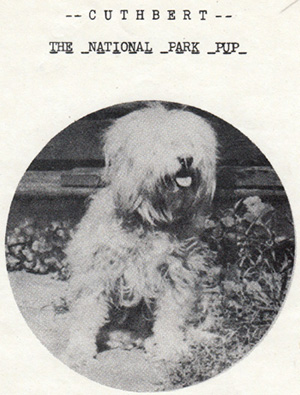
Portrait of Cuthbert, the National Park Pup, 1942. Yellowstone Park Archives, Box A-197.
By February 1942, the United States had entered a war that had engulfed the rest of the world for almost three years. Rationing of resources had just begun. In the Pacific, the American military faced defeat in the Philippines, and German U-boats targeted American merchant shipping across the Atlantic. Among the many federal responses to the uncertainty on the home front was a radio program created by the National Park Service, the prospectus for which is in the holdings of the Heritage and Research Center's archives. "Cuthbert, the National Park Pup" was written by Dorothea J. Lewis, the author of other successful National Parks-focused radio programs, and was offered to local radio stations and schools as an opportunity for America's youth to get involved with radio and to learn about their National Parks, "so that the war-emergency may not color their childhood and occupy their thoughts with fear," according to the program's proposal.
The series featured Cuthbert, an adorable shaggy dog, who, as a puppy in a pet store window, is mocked by passersby, who declare Cuthey to look "more like a wild animal than a dog." So Cuthbert runs away, on a quest to find a wild place where he belongs, and he makes the rounds of the National Park system in the process - making friends with a variety of animals and dodging park rangers along the way, since dogs were prohibited from Park lands. In fact, Cuthbert's story was a bone of contention among park employees, who wondered if the radio program's admonitions against dogs in the National Parks were enough to educate the public about the ban.
In Yellowstone, Cuthbert makes the acquaintance of Aloysius the black bear cub, and together they look for Aloysius's hibernating mother. At the end of the sheepdog's adventures (told over fifteen 15-minute programs), he gives up life on the lam, turning himself in to the ranger service in order to save his friend, a deer, from poachers. The kindly ranger takes Cuthey in, and our hero has finally found "a proper doggie home." Filled with facts about the Parks and their wildlife, "Cuthbert, the National Park Pup" was designed to educate as well as delight. Organizers envisioned young students enrolled in "Cuthbert Clubs" and held the adorable pup as an ideal role model. "A friendly, brave, modest little fellow, something of a teacher of the fitness of things," the proposal declared, "Cuthbert is a good hero for children" - at a time in which the title was not thrown about lightly.
Advertised throughout 1942 in educational journals, the radio program was designed to be read and produced by local children, "masters of make-believe" who would be cast by teachers, school officials, and/or local radio personnel. Each local radio station could choose to broadcast the whole series or just the episode relevant to their region, with educators incorporating the project into local school curriculum and the series itself providing information about the nation's Parks to a populace focused on wartime. Radio stations throughout Montana, Wyoming, and Idaho were approached about airing the series, particularly the episode about Yellowstone. Though it's unclear from our holdings whether the series was definitively aired, judging by the popularity of other NPS-focused programs (and those by Dorothea Lewis particularly), it is likely that the series did see airtime. The question of whether Cuthbert went on to become "a Mickey Mouse of the airways," however, remains unanswered.
Source: "Cuthbert, the National Park Pup," Radio Addresses, Publicity 1937-1953.
